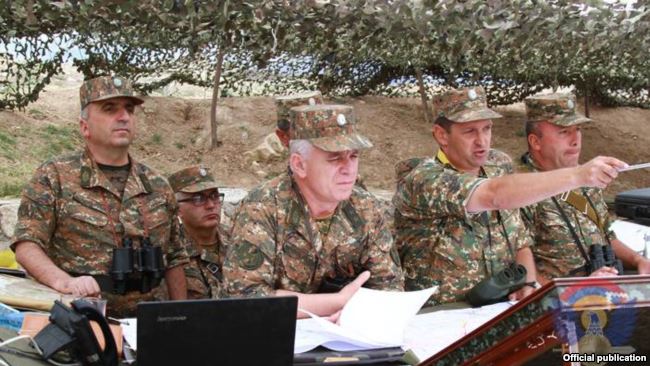
Analysis by Emil Sanamyan
Defense Army commander Gen. Levon Mnatsakanyan has been dismissed and reassigned as the head of the local ministry of emergency management, the office of Artsakh president reported on December 14. Mnatsakanyan has been replaced by his first deputy and army chief of staff Gen. Karen Abrahamyan and the latter, in turn, by Col. Jalal Harutyunyan, who previously headed the Army’s southern command.
Abrahamyan is only the fifth individual to command the Defense Army. The first commander, Samvel Babayan (1992-2000) was also the only other commander to be dismissed without promotion. The two others, Seyran Ohanyan (2000-7) and Movses Hakobyan (2007-15), later served in senior positions in Yerevan.
An artillery officer with a 27-year service record, Mnatsakanyan took over the Defense Army command at the time of escalating tensions with Azerbaijan that culminated in the April 2016 war. In a parting statement, he said that he was “proud of his service and ready to rejoin the army should such a necessity again arise.”
“It was a great honor to serve alongside all those privates, sergeants, officers and generals, who through their daily conscientious service strengthened our defense system,” said Mnatsakanyan. “I hope that from today on we will retain the unbending will and determination to ensure the defense and security of our country.”
Both Abrahamyan and Harutyunyan are career officers, who started their service as rank-and-file soldiers during the war. Abrahamyan was awarded the Combat Cross for his courage in combat in October 1993 against Afghan mercenary forces, then fighting on Azerbaijan’s side. Harutyunyan is an artillery officer, who served under Mnatsakanyan in the early to mid-1990s, and later rose to some of the most sensitive command positions; in December 2015 Harutyunyan came to public attention after the Azerbaijani government claimed that he was killed in shelling and he went on television to personally deny that claim.
Political and historical context
Mnatsakanyan’s replacement came after days of rumors that it was demanded by the acting Prime Minister Nikol Pashinyan. Pashinyan previously expressed anger that several Karabakh officials, including the official Defense Army spokesman, criticized members of his campaign ahead of the December 9 parliamentary elections. He also hinted that Armenian security agencies would soon launch corruption investigations against some of them.
Mnatsakanyan’s appointment as emergencies minister came after Pashinyan’s meeting with NKR president Bako Sahakyan and presumably reflects latter’s intention to protect Mnatsakanyan from any prosecution.
The spat was sparked by the Pashinyan party MP Sassun Mikaelyan, also a veteran of the Karabakh war. During a campaign rally on November 26 he suggested that the change of government in Armenia last spring was perhaps a more significant development than the victory in Karabakh war. The statement was widely criticized and walked back by both Pashinyan and Mikaelyan.
Among the critics were several NKR officials, including senior aides to the NKR president Arshavir Gharamyan and David Babayan. Babayan, Gharamyan, as well as Mnatsakanyan had previously expressed criticisms over Pashinyan-led protests in Armenia and later, over some of his government appointments. But until recently focused on the power transition from Serzh Sargsyan in Yerevan, Pashinyan avoided a direct confrontation with the former government’s allies in Stepanakert.
Pashinyan has been less patient with his Yerevan-based critics. When the former national security service (NSS) director David Shahnazaryan, running on former ruling party Republican Party ticket, alleged that Pashinyan intended to “sell out” on Karabakh – a frequently heard charge in Armenian politics – Pashinyan ordered the NSS to summon Shahnazaryan for questioning.
Among other things, Shahnazaryan also alleged that in January 1994, Mikaelyan faced court martial over his poor performance in the Karabakh war. At the time, the Azerbaijani advance through the narrow Omar Pass in Kelbajar district was apparently missed by Mikaelyan’s unit, leading to major Armenian casualties and loss of territory that was recaptured by other Armenian units, including those under the command of Gharamyan and Mnatsakanyan.
That past record of accomplishment not withstanding, the current NKR leadership remains closely associated with ex-president Sargsyan and leadership changes in Karabakh are unlikely to stop at today’s replacement.
Armenian leaders influenced the “reformatting” of NKR leadership before. In 1992, then Levon Ter-Petrosyan allies Robert Kocharyan and Serzh Sargsyan sideline the elected Dashnak leadership of the NKR parliament. In the late 1990s, by then Armenian president Kocharyan and defense minister Vazgen Sargsyan promoted Arkady Ghukasyan as president and ousted Samvel Babayan as defense minister. And in 2007, Serzh Sargsyan is believed to have encouraged Bako Sahakyan to run for president instead of other candidates.









